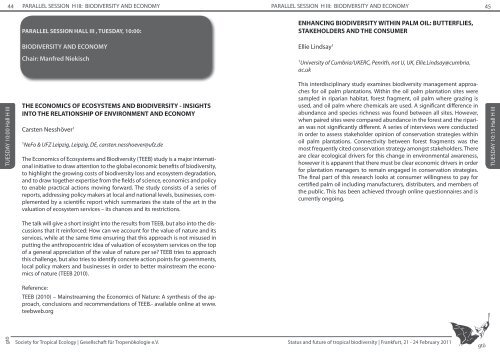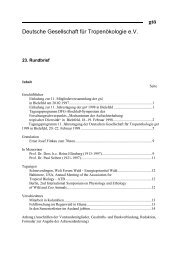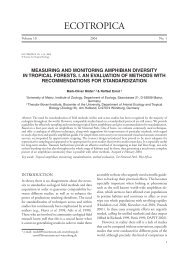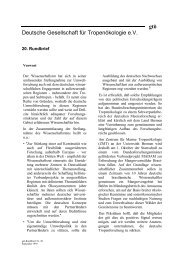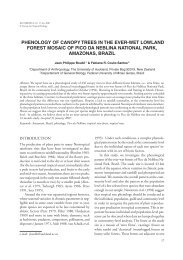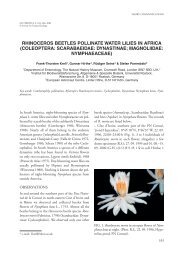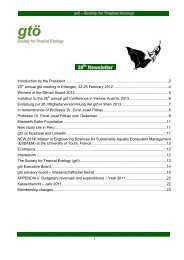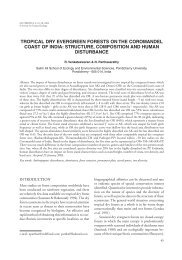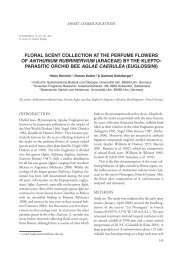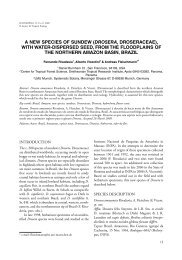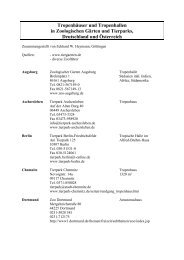Abstract booklet - gtö – Society for Tropical Ecology
Abstract booklet - gtö – Society for Tropical Ecology
Abstract booklet - gtö – Society for Tropical Ecology
Create successful ePaper yourself
Turn your PDF publications into a flip-book with our unique Google optimized e-Paper software.
44 PARALLEL SESSION H III: BIODIVERSITY AND ECONOMYPARALLEL SESSION H III: BIODIVERSITY AND ECONOMY45PARALLEL SESSION HALL III , TUESDAY, 10:00:ENHANCING BIODIVERSITY WITHIN PALM OIL: BUTTERFLIES,STAKEHOLDERS AND THE CONSUMERBIODIVERSITY AND ECONOMYEllie Lindsay 1Chair: Manfred Niekisch1 University of Cumbria/UKERC, Penrith, not U, UK, Ellie.Lindsay@cumbria.ac.ukTUESDAY 10:00 Hall H IIITHE ECONOMICS OF ECOSYSTEMS AND BIODIVERSITY - INSIGHTSINTO THE RELATIONSHIP OF ENVIRONMENT AND ECONOMYCarsten Nesshöver 11 NeFo & UFZ Leipzig, Leipzig, DE, carsten.nesshoever@ufz.deThe Economics of Ecosystems and Biodiversity (TEEB) study is a major internationalinitiative to draw attention to the global economic benefits of biodiversity,to highlight the growing costs of biodiversity loss and ecosystem degradation,and to draw together expertise from the fields of science, economics and policyto enable practical actions moving <strong>for</strong>ward. The study consists of a series ofreports, addressing policy makers at local and national levels, businesses, complementedby a scientific report which summarizes the state of the art in thevaluation of ecosystem services – its chances and its restrictions.This interdisciplinary study examines biodiversity management approaches<strong>for</strong> oil palm plantations. Within the oil palm plantation sites weresampled in riparian habitat, <strong>for</strong>est fragment, oil palm where grazing isused, and oil palm where chemicals are used. A significant difference inabundance and species richness was found between all sites. However,when paired sites were compared abundance in the <strong>for</strong>est and the riparianwas not significantly different. A series of interviews were conductedin order to assess stakeholder opinion of conservation strategies withinoil palm plantations. Connectivity between <strong>for</strong>est fragments was themost frequently cited conservation strategy amongst stakeholders. Thereare clear ecological drivers <strong>for</strong> this change in environmental awareness,however it is apparent that there must be clear economic drivers in order<strong>for</strong> plantation managers to remain engaged in conservation strategies.The final part of this research looks at consumer willingness to pay <strong>for</strong>certified palm oil including manufacturers, distributers, and members ofthe public. This has been achieved through online questionnaires and iscurrently ongoing.TUESDAY 10:15 Hall H IIIThe talk will give a short insight into the results from TEEB, but also into the discussionsthat it rein<strong>for</strong>ced: How can we account <strong>for</strong> the value of nature and itsservices, while at the same time ensuring that this approach is not misused inputting the anthropocentric idea of valuation of ecosystem services on the topof a general appreciation of the value of nature per se? TEEB tries to approachthis challenge, but also tries to identify concrete action points <strong>for</strong> governments,local policy makers and businesses in order to better mainstream the economicsof nature (TEEB 2010).Reference:TEEB (2010) – Mainstreaming the Economics of Nature: A synthesis of the approach,conclusions and recommendations of TEEB.- available online at www.teebweb.orggtö<strong>Society</strong> <strong>for</strong> <strong>Tropical</strong> <strong>Ecology</strong> | Gesellschaft für Tropenökologie e.V. Status and future of tropical biodiversity | Frankfurt, 21 - 24 February 2011gtö


